Unit 1 Where did you go on vacation Section A (Grammar Focus-3c)课件(共46张PPT)
文档属性
| 名称 | Unit 1 Where did you go on vacation Section A (Grammar Focus-3c)课件(共46张PPT) | 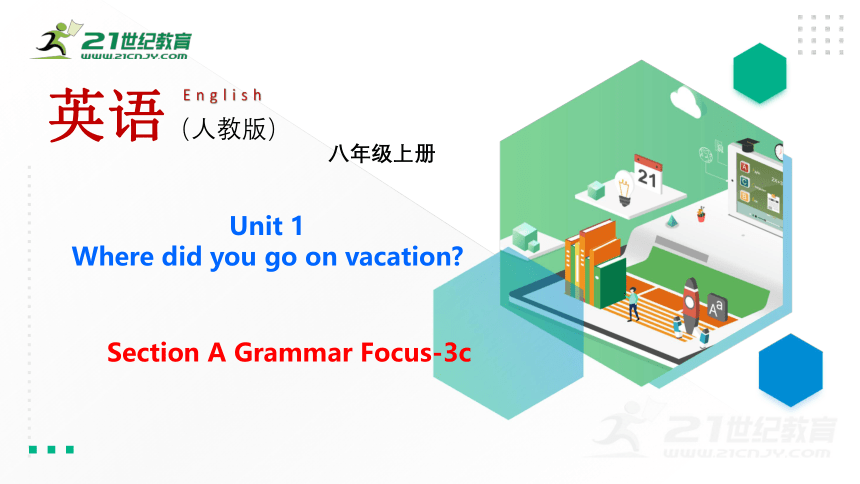 | |
| 格式 | pptx | ||
| 文件大小 | 9.0MB | ||
| 资源类型 | 试卷 | ||
| 版本资源 | 人教新目标(Go for it)版 | ||
| 科目 | 英语 | ||
| 更新时间 | 2022-08-02 08:35:54 | ||
图片预览

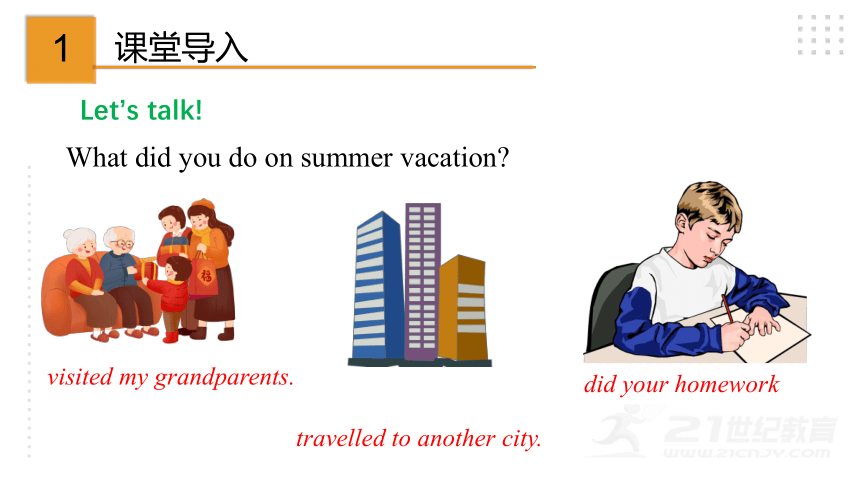
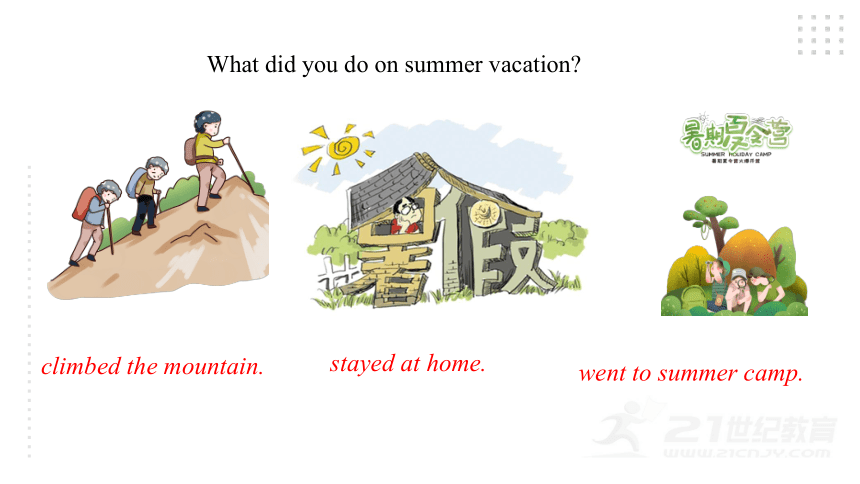
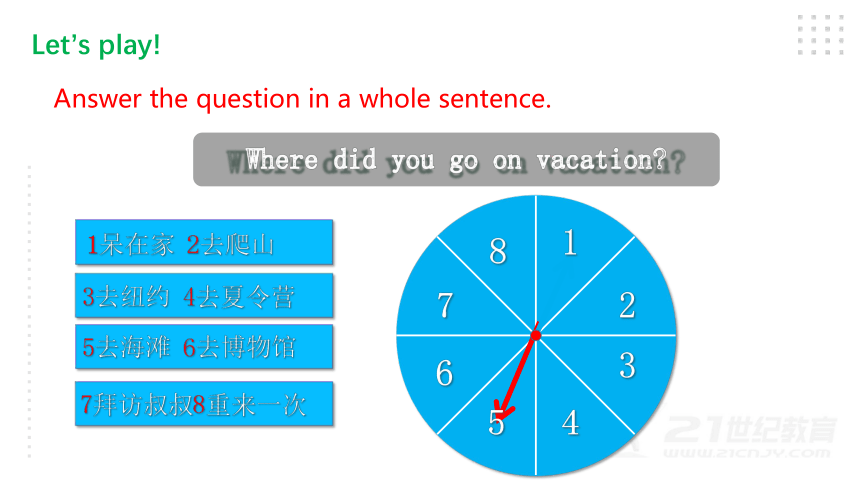
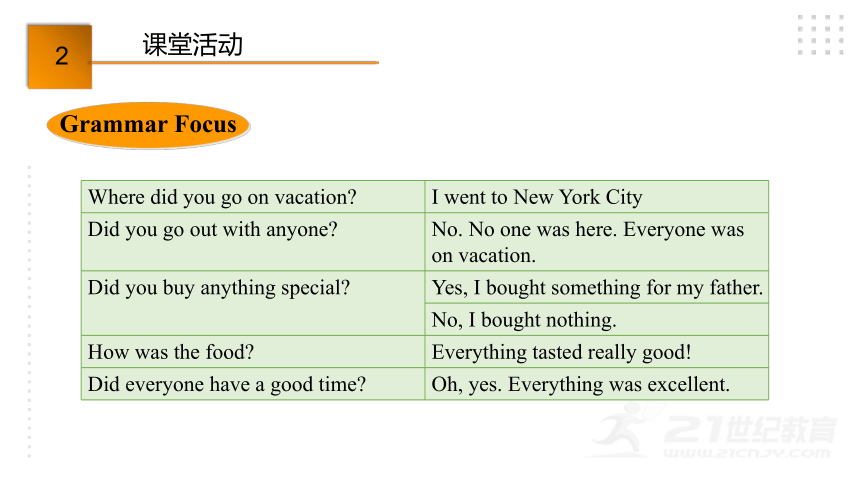
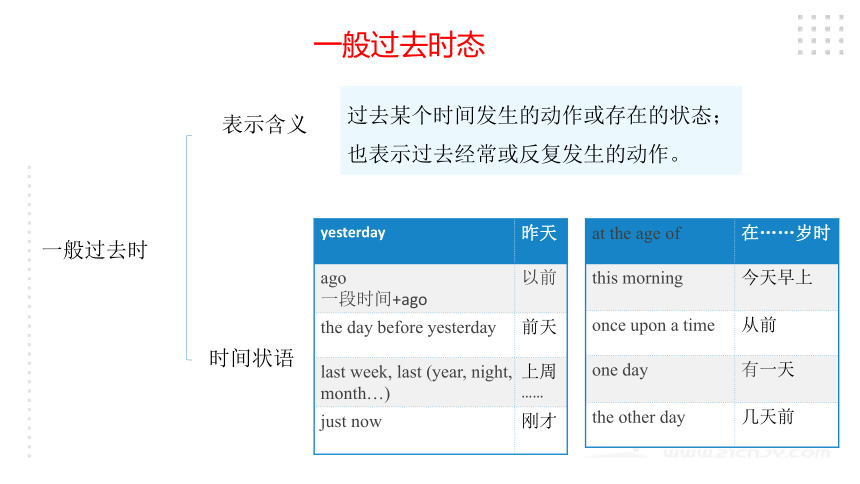
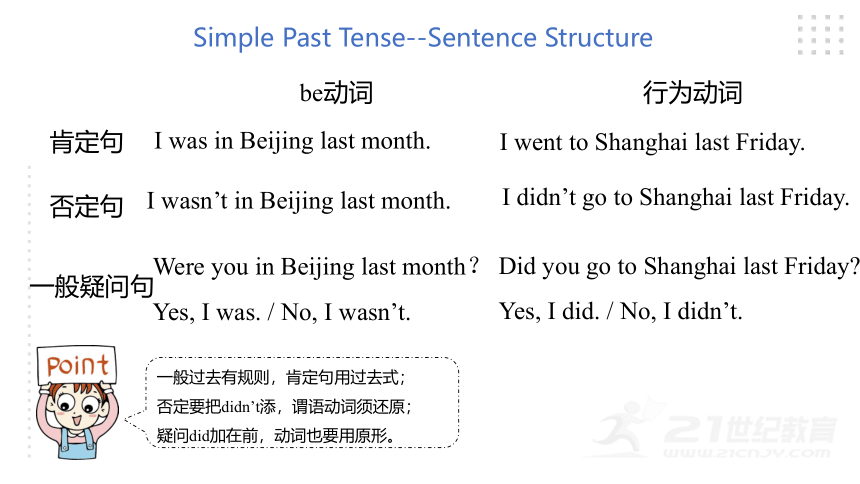
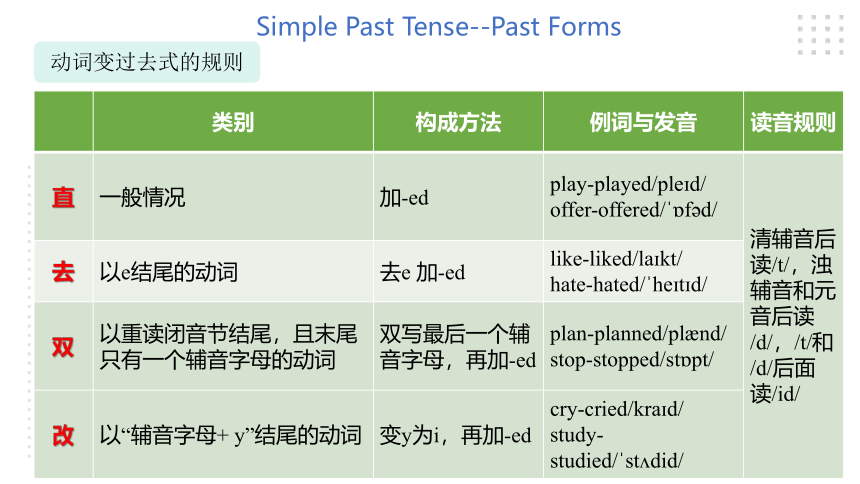
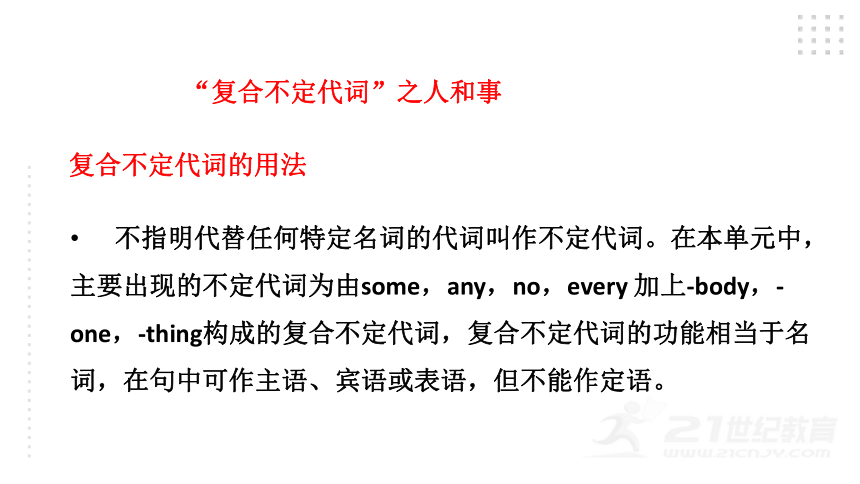
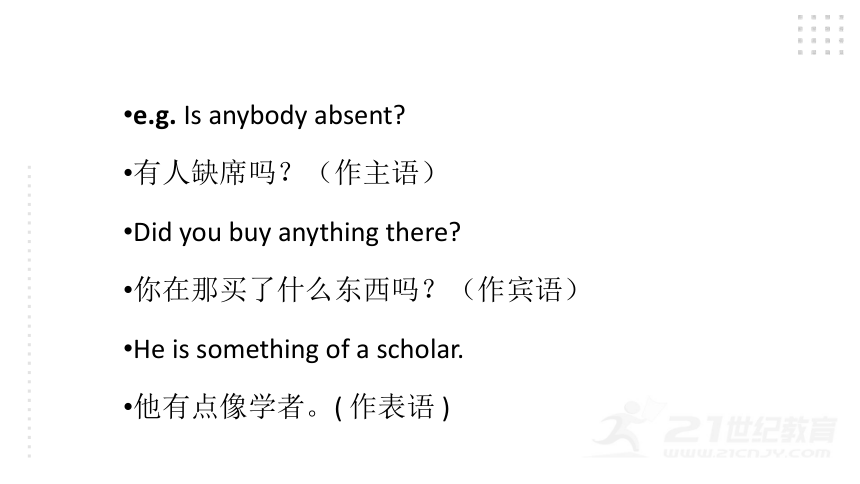
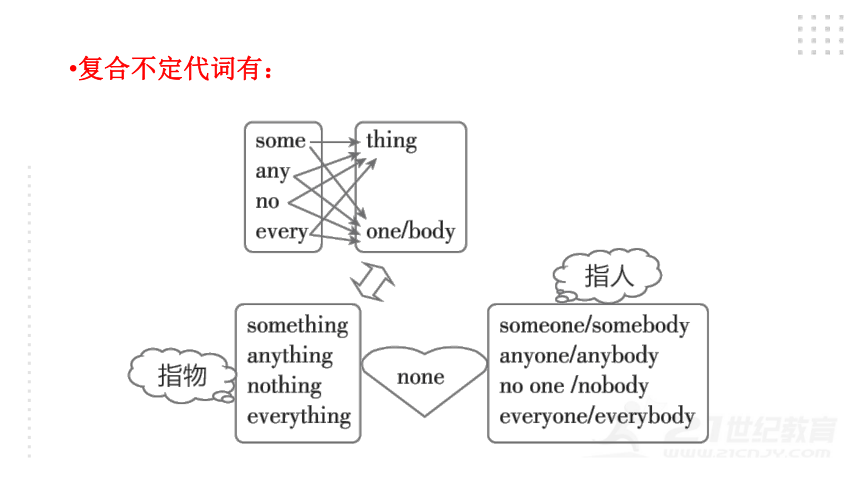
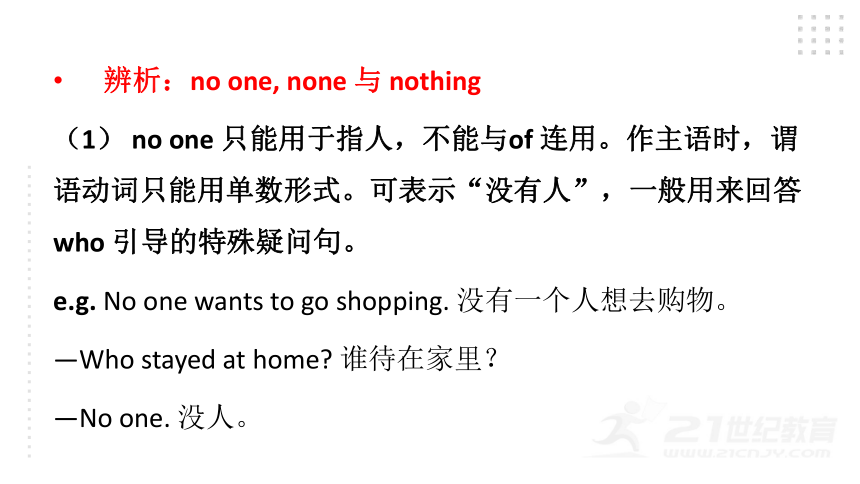
文档简介
(共46张PPT)
英语(人教版)
八年级上册
English
Unit 1
Where did you go on vacation
Section A Grammar Focus-3c
What did you do on summer vacation
visited my grandparents.
travelled to another city.
did your homework
1
课堂导入
Let’s talk!
climbed the mountain.
What did you do on summer vacation
stayed at home.
went to summer camp.
Where did you go on vacation
1
2
3
4
5
6
7
8
1呆在家 2去爬山
3去纽约 4去夏令营
5去海滩 6去博物馆
7拜访叔叔8重来一次
Answer the question in a whole sentence.
Let’s play!
Where did you go on vacation I went to New York City
Did you go out with anyone No. No one was here. Everyone was on vacation.
Did you buy anything special Yes, I bought something for my father.
No, I bought nothing.
How was the food Everything tasted really good!
Did everyone have a good time Oh, yes. Everything was excellent.
Grammar Focus
2
课堂活动
表示含义
时间状语
过去某个时间发生的动作或存在的状态;也表示过去经常或反复发生的动作。
一般过去时
一般过去时态
yesterday 昨天
ago 一段时间+ago 以前
the day before yesterday 前天
last week, last (year, night, month…) 上周
……
just now 刚才
at the age of 在……岁时
this morning 今天早上
once upon a time 从前
one day 有一天
the other day 几天前
I was in Beijing last month.
I went to Shanghai last Friday.
I wasn’t in Beijing last month.
I didn’t go to Shanghai last Friday.
Were you in Beijing last month?
Yes, I was. / No, I wasn’t.
Did you go to Shanghai last Friday
Yes, I did. / No, I didn’t.
肯定句
否定句
一般疑问句
be动词
行为动词
一般过去有规则,肯定句用过去式;
否定要把didn’t添,谓语动词须还原;
疑问did加在前,动词也要用原形。
Simple Past Tense--Sentence Structure
类别 构成方法 例词与发音 读音规则
直 一般情况 加-ed play-played/ple d/ offer-offered/ f d/ 清辅音后读/t/,浊辅音和元音后读/d/,/t/和/d/后面读/id/
去 以e结尾的动词 去e 加-ed like-liked/la kt/ hate-hated/ he t d/
双 以重读闭音节结尾,且末尾只有一个辅音字母的动词 双写最后一个辅音字母,再加-ed plan-planned/pl nd/ stop-stopped/st pt/
改 以“辅音字母+ y”结尾的动词 变y为i,再加-ed cry-cried/kra d/ study-studied/ st did/
动词变过去式的规则
Simple Past Tense--Past Forms
“复合不定代词”之人和事
复合不定代词的用法
不指明代替任何特定名词的代词叫作不定代词。在本单元中,主要出现的不定代词为由some,any,no,every 加上-body,-one,-thing构成的复合不定代词,复合不定代词的功能相当于名词,在句中可作主语、宾语或表语,但不能作定语。
e.g. Is anybody absent
有人缺席吗?(作主语)
Did you buy anything there
你在那买了什么东西吗?(作宾语)
He is something of a scholar.
他有点像学者。( 作表语 )
复合不定代词有:
辨析:no one, none 与 nothing
(1) no one 只能用于指人,不能与of 连用。作主语时,谓语动词只能用单数形式。可表示“没有人”,一般用来回答who 引导的特殊疑问句。
e.g. No one wants to go shopping. 没有一个人想去购物。
—Who stayed at home 谁待在家里?
—No one. 没人。
(2) none 表示“没有一个”。既可指人,也可指物。其后可接of 短语,“none of +可数名词复数”作主语时谓语动词用单、复数皆可。可指数量上“一个也没有”,一般用来回答how many/much 引导的特殊疑问句。
e.g. None of these pens work/works. 这些钢笔没有一支能用。
— How many students are there in the classroom
教室里有多少学生?
—None. 一个也没有。
(3) nothing 只能用于指物,作主语时,谓语动词只能用单数形式。可用来回答what引导的特殊疑问句。
e.g. —What is in the box 箱子里有什么?
—Nothing. 什么东西也没有。
no one 等于nobody, 专门指人记心间。
none 的用法有两个:
强调数量需用none,此处可要细思量;
of 连用作主语,谓语单复均可商。
nothing 指物没什么,
同类词见something (anything, everything)。
复合不定代词被定语(形容词、不定式、else等)修饰时,定语要后置。
复合不定代词 + 形容词
复合不定代词 + 不定式
There is something important in today’s newspaper.
今天报纸上有一些重要的信息。
Do you have anything to say 你有什么要说的吗?
Ask someone else to help you. 另请个人来帮帮你吧。
somebody/ someone/ something一般用于肯定句,以及希望得到肯定回答的一般疑问句。
anybody/ anyone/ anything一般用于否定句、一般疑问句或强调任何之意的肯定句。
复合不定代词 用法 例句
everything everyone everybody 用于肯定句、否定句及疑问句中 Everyone is here today.
Money isn’t everything.
How is everything
Did everyone in your class go for a trip
Last week, I went ________ and I took lots of photos.
interesting somewhere B. somewhere interesting
C. interesting anywhere D. anywhere interesting
2. Did you go ____?
warm somewhere B. anywhere warm
C. warm anywhere D. somewhere warm
3. I can’t find my pen ________.
somewhere B. nowhere
C. anywhere D. everywhere
练一练
3a
anyone
something
anything
everything
nothing
Linda: Did you do _________ fun on your vacation, Alice
Alice: Yes, I did. I went to Sanya.
Linda: How did you like it
Alice: Well, it was my first time there, so_________ was really interesting.
Linda: Did you do with ________
Alice: Yes, I did. I went with my sister.
Linda: Did you go shopping
Alice: Of course! I bought __________ for my parents, but _________ for myself.
Linda: Why didn’t you buy _________ for yourself
Alice: I didn’t really see__________ I liked.
anything
everything
anyone
something
nothing
anything
anything
Fill in the blanks with the words in the box and practice the conversation.
当然;自然。
Of course not. 当然不。
反身代词,我自己
反身代词,你自己
1.How did you like it?
=What do you think of it
你觉得它怎么样?
3b
anything everything nothing everyone no one
anything
everyone/anyone
Everything
nothing
no one
Fill in the blanks in the email message with the words in the box.
21
Dear Bill,
How was your vacation Did you do anything interesting Did anyone in the family go with you I went to a friend’s farm in the countryside with my family. Everything was great. We fed some hens and saw some baby pigs. They were so cute! The only problem was that there was nothing much to do in the evening but read. Still no one seemed to be bored. Bye for now!
Mark
1. Where did Mark go on his vacation
2. How was his vacation
4. What was the problem
5. Did anyone seem bored
3b
3. What animal did they feed
Read this e-mail again and answer the questions.
Ask your group questions about their last vacation. Then tell the class your results
3c
Did you… Everyone Someone(write the classmate’s name) No one
eat anything at a restaurant
read anything interesting
visit anyone in your family
buy anything?
keep a diary
In our group, everyone ate something at a restaurant…
1. Everything tasted really good!
taste v. 尝起来
e.g. The dish tastes salty.
这道菜尝起来很咸。
He looked surprised when he heard the news.
得知消息时,他显得很吃惊。
连系动词,后接形容词作表语
Language points
拓展:taste 作及物动词,意为“品尝”,其后直接跟宾语;作名词,意为“味道”。
e.g. Have you tasted the wine 你品过这种酒吗?
I don’t like the taste of olives. 我不喜欢橄榄的味道。
The food was tasty. 食物很好吃。
常用的连系动词有:
taste 尝起来 feel 摸起来
seem 似乎 sound 听起来
look 看起来 smell 闻起来
形容词,味道好的;可口的
2. everyone pron. 每人;人人;所有人
everyone 意为“每人”,相当于everybody,作主语时,谓语动词用第三人称单数形式。
every one 意为“每个”,是两个词,既可指人,也可指物,后面可跟介词 of。
辨析:everyone 与 every one
e.g. Everyone in our class likes Mr. Liu.
我们班的每个人都喜欢刘老师。
His books are wonderful. I have read every one of them.
他的书很精彩,每一本我都读了。
Everyone is here, and every one of us has a chance to speak at the meeting.
大家都到了, 我们每个人都有机会在会上发言。
3(高频)How do you like... 你觉得……怎么样?
e.g. —How do you like the program The Voice of China, Jack
杰克,你认为《中国好声音》这个节目怎么样?
—It’s wonderful. 很棒。
常用来询问对方对某人或某事物的看法
同义表达有:
What do you think of...
How do you feel about...
4.of course 当然;自然
e.g. —May I use your pen, please
我可以用一下你的钢笔吗?
—Of course! 当然!
—Would you mind shaking hands with me
你介意和我握手吗?
—Of course not. 当然不。
of course 相当于sure 或certainly,通常在对话中用作肯定回答。
of course 和not 连用,构成否定回答。
5. I bought something for my parents, but nothing for myself.
buy sth. for sb. 给某人买某物
e.g. Lisa bought her friend a pen.
=Lisa bought a pen for her friend.
莉萨给她的朋友买了一支钢笔。
=buy sb. sth.
6.nothing pron. 没有什么;没有一件东西
e.g. Nothing is wrong. 没有什么毛病。
I ate nothing for breakfast.
=I didn’t eat anything for breakfast.
我早饭什么都没吃。
nothing 可与
not...anything
进行同义句转换。
nothing 作主语时谓语动词用第三人称单数形式。
7.myself pron. 我本人;我自己
e.g. I teach myself English. 我自学英语。
I can finish the work by myself. 我自己能够完成那项工作。
动词后作宾语
介词后作宾语
第一人称 第二人称 第三人称
单数 myself yourself himself/herself/itself
复数 ourselves yourselves themselves
拓展:反身代词大集合:
teach oneself自学 I teach myself English. 我自学英语。
learn..by oneself自学 I learn English by myself .
enjoy oneself玩得高兴 We enjoyed ourselves. 我们玩得很开心。
by oneself独自;独立 I do my homework by myself. 我独立完成作业。
help oneself to sth. 自取/自用...;随便吃... You can help yourself to the milk.
8. seem v. 似乎;好像;看来
seem 的用法:
① seem(to be)+n ./adj . 似乎……;好像……
② seem + to do sth. 似乎做某事;好像做某事
③ It seems + that 从句或as if 从句
似乎/ 看起来好像……
e.g. Everything seems so easy. 一切似乎都很容易。
Her mother seems very happy after hearing the news.
她母亲听到这个消息后似乎很高兴。
He seems happy.=He seems to be happy.
=It seems that he is happy.
=It seems as if he is happy. 他看上去好像很高兴。
—Look at the dark clouds, and the wind is blowing strongly.
—It _____ that a big storm is coming. [本溪]
A. sounds B. seems C. feels D. smells
B
小小seem 有本领,身后跟随名或形。
seem to do “似乎做”,It seems 后面that 从句。
9(高频)bored adj. 厌倦的;烦闷的
e.g. People seem to be bored with more and more singing competitions.
人们似乎对越来越多的歌唱比赛感到厌倦了。
对……感到厌烦
以-ed结尾的形容词通常用来描述人;以-ing 结尾的形容词通常用来描述事物。类似的形容词还有:
interested 感兴趣的 interesting 令人感兴趣的
surprised 吃惊的 surprising 令人吃惊的
excited 兴奋的 exciting 令人兴奋的
relaxed 放松的 relaxing 令人放松的
e.g. He feels bored in the library. 在图书馆里他觉得很无聊。
I find the story very boring. 我发现这个故事太无聊了。
bored adj . 厌倦的 形容人的心理状态。作表语,通常修饰或描述人。
boring adj . 令人厌倦的 强调事物本身的性质。作表语或定语,通常修饰或描述事或物。
辨析:bored 与boring
New words: something, nothing, everyone, myself, yourself, hen, pig, seem, bored, someone, diary
Expression: of course
Grammar:①Indefinite pronouns
②Question structure of the simple past tense
. Sentences:
① —Where did you go on vacation?— I went to New York City.
② — Did you go out with anyone?— Did you buy anything special
③ — How was the food? How was your vacation
3
课堂小结
一、 单项选择
1.David is a tennis player. He to play tennis when he was six years old.
begins B. will begin C. began D. has begun
C
3.—Is there else in the classroom
—It’s empty. is listening to a speech in the school hall.
anyone; Anyone B. anyone; Everyone
C. everyone; Anyone D. everyone; Everyone
B
2. — Did you go to the museum
— ____. I saw many old things in the museum.
A. Not really B. Of course C. Sounds good D. Sorry
B
4
课堂训练
4.Please listen to the teacher carefully. She has important to tell us.
something B. everything
C. anything D. nothing
A
5. —I want to buy ______for my grandpa to make him happy.
—That’s a good idea.
A. something special B. special something
C. anything special D. special anything
A
6. — ______ was your trip to Hong Kong, Lisa
—Great! I enjoyed ______ there with my parents.
A. How; me B. What; myself
C. How; myself D. Where; mine
C
7.—The soccer game was so ______ .
—Yes. I felt ______ with it.
A. bored; boring B. boring; bored
C. bored; bored D. boring; boring
B
9. — Did you go to the museum
— ____. I saw many old things in the museum.
A. Not really B. Of course
C. Sounds good D. Sorry
B
二、根据汉语意思完成句子,每空一词。
1. 我没有给自己买东西,因为那里没有我喜爱的东西。
I didn’t ________ ________ ________ ________
because there was nothing I liked there.
buy anything for myself
2. 我的妹妹总是用英语记日记。
My sister always ______ ______ ______ in English.
keeps a diary
3. 下了一整天雨,所以我除了睡觉无事可做。
It rained all day, so I had _______ _______ _______ but sleep.
nothing to do
4. 这个小女孩很聪明,她似乎知道一切。
The little girl is very clever. She ________ ____ ______ _______.
seems to
know everything
5. 上周末他们在乡下做了有趣的事。
They _______ ________ ______ in the countryside last weekend.
did something interesting
三、从方框中选择合适的复合不定代词填空,有三项多余。
1. Jack is so funny that __________ likes him in my class.
2. I took ___________ with me except(除……外)a camera on vacation.
3.A smile costs ________ , but it can give a lot.
everything, something, anything, nothing, someone, anyone, everyone, no one
everyone
everything
nothing
4. Be quiet, please. I have ___________ exciting to tell you now.
5. All the students are having a P.E. class outside, so you can’t find ________ in the classroom.
something
anyone
https://www.21cnjy.com/help/help_extract.php
英语(人教版)
八年级上册
English
Unit 1
Where did you go on vacation
Section A Grammar Focus-3c
What did you do on summer vacation
visited my grandparents.
travelled to another city.
did your homework
1
课堂导入
Let’s talk!
climbed the mountain.
What did you do on summer vacation
stayed at home.
went to summer camp.
Where did you go on vacation
1
2
3
4
5
6
7
8
1呆在家 2去爬山
3去纽约 4去夏令营
5去海滩 6去博物馆
7拜访叔叔8重来一次
Answer the question in a whole sentence.
Let’s play!
Where did you go on vacation I went to New York City
Did you go out with anyone No. No one was here. Everyone was on vacation.
Did you buy anything special Yes, I bought something for my father.
No, I bought nothing.
How was the food Everything tasted really good!
Did everyone have a good time Oh, yes. Everything was excellent.
Grammar Focus
2
课堂活动
表示含义
时间状语
过去某个时间发生的动作或存在的状态;也表示过去经常或反复发生的动作。
一般过去时
一般过去时态
yesterday 昨天
ago 一段时间+ago 以前
the day before yesterday 前天
last week, last (year, night, month…) 上周
……
just now 刚才
at the age of 在……岁时
this morning 今天早上
once upon a time 从前
one day 有一天
the other day 几天前
I was in Beijing last month.
I went to Shanghai last Friday.
I wasn’t in Beijing last month.
I didn’t go to Shanghai last Friday.
Were you in Beijing last month?
Yes, I was. / No, I wasn’t.
Did you go to Shanghai last Friday
Yes, I did. / No, I didn’t.
肯定句
否定句
一般疑问句
be动词
行为动词
一般过去有规则,肯定句用过去式;
否定要把didn’t添,谓语动词须还原;
疑问did加在前,动词也要用原形。
Simple Past Tense--Sentence Structure
类别 构成方法 例词与发音 读音规则
直 一般情况 加-ed play-played/ple d/ offer-offered/ f d/ 清辅音后读/t/,浊辅音和元音后读/d/,/t/和/d/后面读/id/
去 以e结尾的动词 去e 加-ed like-liked/la kt/ hate-hated/ he t d/
双 以重读闭音节结尾,且末尾只有一个辅音字母的动词 双写最后一个辅音字母,再加-ed plan-planned/pl nd/ stop-stopped/st pt/
改 以“辅音字母+ y”结尾的动词 变y为i,再加-ed cry-cried/kra d/ study-studied/ st did/
动词变过去式的规则
Simple Past Tense--Past Forms
“复合不定代词”之人和事
复合不定代词的用法
不指明代替任何特定名词的代词叫作不定代词。在本单元中,主要出现的不定代词为由some,any,no,every 加上-body,-one,-thing构成的复合不定代词,复合不定代词的功能相当于名词,在句中可作主语、宾语或表语,但不能作定语。
e.g. Is anybody absent
有人缺席吗?(作主语)
Did you buy anything there
你在那买了什么东西吗?(作宾语)
He is something of a scholar.
他有点像学者。( 作表语 )
复合不定代词有:
辨析:no one, none 与 nothing
(1) no one 只能用于指人,不能与of 连用。作主语时,谓语动词只能用单数形式。可表示“没有人”,一般用来回答who 引导的特殊疑问句。
e.g. No one wants to go shopping. 没有一个人想去购物。
—Who stayed at home 谁待在家里?
—No one. 没人。
(2) none 表示“没有一个”。既可指人,也可指物。其后可接of 短语,“none of +可数名词复数”作主语时谓语动词用单、复数皆可。可指数量上“一个也没有”,一般用来回答how many/much 引导的特殊疑问句。
e.g. None of these pens work/works. 这些钢笔没有一支能用。
— How many students are there in the classroom
教室里有多少学生?
—None. 一个也没有。
(3) nothing 只能用于指物,作主语时,谓语动词只能用单数形式。可用来回答what引导的特殊疑问句。
e.g. —What is in the box 箱子里有什么?
—Nothing. 什么东西也没有。
no one 等于nobody, 专门指人记心间。
none 的用法有两个:
强调数量需用none,此处可要细思量;
of 连用作主语,谓语单复均可商。
nothing 指物没什么,
同类词见something (anything, everything)。
复合不定代词被定语(形容词、不定式、else等)修饰时,定语要后置。
复合不定代词 + 形容词
复合不定代词 + 不定式
There is something important in today’s newspaper.
今天报纸上有一些重要的信息。
Do you have anything to say 你有什么要说的吗?
Ask someone else to help you. 另请个人来帮帮你吧。
somebody/ someone/ something一般用于肯定句,以及希望得到肯定回答的一般疑问句。
anybody/ anyone/ anything一般用于否定句、一般疑问句或强调任何之意的肯定句。
复合不定代词 用法 例句
everything everyone everybody 用于肯定句、否定句及疑问句中 Everyone is here today.
Money isn’t everything.
How is everything
Did everyone in your class go for a trip
Last week, I went ________ and I took lots of photos.
interesting somewhere B. somewhere interesting
C. interesting anywhere D. anywhere interesting
2. Did you go ____?
warm somewhere B. anywhere warm
C. warm anywhere D. somewhere warm
3. I can’t find my pen ________.
somewhere B. nowhere
C. anywhere D. everywhere
练一练
3a
anyone
something
anything
everything
nothing
Linda: Did you do _________ fun on your vacation, Alice
Alice: Yes, I did. I went to Sanya.
Linda: How did you like it
Alice: Well, it was my first time there, so_________ was really interesting.
Linda: Did you do with ________
Alice: Yes, I did. I went with my sister.
Linda: Did you go shopping
Alice: Of course! I bought __________ for my parents, but _________ for myself.
Linda: Why didn’t you buy _________ for yourself
Alice: I didn’t really see__________ I liked.
anything
everything
anyone
something
nothing
anything
anything
Fill in the blanks with the words in the box and practice the conversation.
当然;自然。
Of course not. 当然不。
反身代词,我自己
反身代词,你自己
1.How did you like it?
=What do you think of it
你觉得它怎么样?
3b
anything everything nothing everyone no one
anything
everyone/anyone
Everything
nothing
no one
Fill in the blanks in the email message with the words in the box.
21
Dear Bill,
How was your vacation Did you do anything interesting Did anyone in the family go with you I went to a friend’s farm in the countryside with my family. Everything was great. We fed some hens and saw some baby pigs. They were so cute! The only problem was that there was nothing much to do in the evening but read. Still no one seemed to be bored. Bye for now!
Mark
1. Where did Mark go on his vacation
2. How was his vacation
4. What was the problem
5. Did anyone seem bored
3b
3. What animal did they feed
Read this e-mail again and answer the questions.
Ask your group questions about their last vacation. Then tell the class your results
3c
Did you… Everyone Someone(write the classmate’s name) No one
eat anything at a restaurant
read anything interesting
visit anyone in your family
buy anything?
keep a diary
In our group, everyone ate something at a restaurant…
1. Everything tasted really good!
taste v. 尝起来
e.g. The dish tastes salty.
这道菜尝起来很咸。
He looked surprised when he heard the news.
得知消息时,他显得很吃惊。
连系动词,后接形容词作表语
Language points
拓展:taste 作及物动词,意为“品尝”,其后直接跟宾语;作名词,意为“味道”。
e.g. Have you tasted the wine 你品过这种酒吗?
I don’t like the taste of olives. 我不喜欢橄榄的味道。
The food was tasty. 食物很好吃。
常用的连系动词有:
taste 尝起来 feel 摸起来
seem 似乎 sound 听起来
look 看起来 smell 闻起来
形容词,味道好的;可口的
2. everyone pron. 每人;人人;所有人
everyone 意为“每人”,相当于everybody,作主语时,谓语动词用第三人称单数形式。
every one 意为“每个”,是两个词,既可指人,也可指物,后面可跟介词 of。
辨析:everyone 与 every one
e.g. Everyone in our class likes Mr. Liu.
我们班的每个人都喜欢刘老师。
His books are wonderful. I have read every one of them.
他的书很精彩,每一本我都读了。
Everyone is here, and every one of us has a chance to speak at the meeting.
大家都到了, 我们每个人都有机会在会上发言。
3(高频)How do you like... 你觉得……怎么样?
e.g. —How do you like the program The Voice of China, Jack
杰克,你认为《中国好声音》这个节目怎么样?
—It’s wonderful. 很棒。
常用来询问对方对某人或某事物的看法
同义表达有:
What do you think of...
How do you feel about...
4.of course 当然;自然
e.g. —May I use your pen, please
我可以用一下你的钢笔吗?
—Of course! 当然!
—Would you mind shaking hands with me
你介意和我握手吗?
—Of course not. 当然不。
of course 相当于sure 或certainly,通常在对话中用作肯定回答。
of course 和not 连用,构成否定回答。
5. I bought something for my parents, but nothing for myself.
buy sth. for sb. 给某人买某物
e.g. Lisa bought her friend a pen.
=Lisa bought a pen for her friend.
莉萨给她的朋友买了一支钢笔。
=buy sb. sth.
6.nothing pron. 没有什么;没有一件东西
e.g. Nothing is wrong. 没有什么毛病。
I ate nothing for breakfast.
=I didn’t eat anything for breakfast.
我早饭什么都没吃。
nothing 可与
not...anything
进行同义句转换。
nothing 作主语时谓语动词用第三人称单数形式。
7.myself pron. 我本人;我自己
e.g. I teach myself English. 我自学英语。
I can finish the work by myself. 我自己能够完成那项工作。
动词后作宾语
介词后作宾语
第一人称 第二人称 第三人称
单数 myself yourself himself/herself/itself
复数 ourselves yourselves themselves
拓展:反身代词大集合:
teach oneself自学 I teach myself English. 我自学英语。
learn..by oneself自学 I learn English by myself .
enjoy oneself玩得高兴 We enjoyed ourselves. 我们玩得很开心。
by oneself独自;独立 I do my homework by myself. 我独立完成作业。
help oneself to sth. 自取/自用...;随便吃... You can help yourself to the milk.
8. seem v. 似乎;好像;看来
seem 的用法:
① seem(to be)+n ./adj . 似乎……;好像……
② seem + to do sth. 似乎做某事;好像做某事
③ It seems + that 从句或as if 从句
似乎/ 看起来好像……
e.g. Everything seems so easy. 一切似乎都很容易。
Her mother seems very happy after hearing the news.
她母亲听到这个消息后似乎很高兴。
He seems happy.=He seems to be happy.
=It seems that he is happy.
=It seems as if he is happy. 他看上去好像很高兴。
—Look at the dark clouds, and the wind is blowing strongly.
—It _____ that a big storm is coming. [本溪]
A. sounds B. seems C. feels D. smells
B
小小seem 有本领,身后跟随名或形。
seem to do “似乎做”,It seems 后面that 从句。
9(高频)bored adj. 厌倦的;烦闷的
e.g. People seem to be bored with more and more singing competitions.
人们似乎对越来越多的歌唱比赛感到厌倦了。
对……感到厌烦
以-ed结尾的形容词通常用来描述人;以-ing 结尾的形容词通常用来描述事物。类似的形容词还有:
interested 感兴趣的 interesting 令人感兴趣的
surprised 吃惊的 surprising 令人吃惊的
excited 兴奋的 exciting 令人兴奋的
relaxed 放松的 relaxing 令人放松的
e.g. He feels bored in the library. 在图书馆里他觉得很无聊。
I find the story very boring. 我发现这个故事太无聊了。
bored adj . 厌倦的 形容人的心理状态。作表语,通常修饰或描述人。
boring adj . 令人厌倦的 强调事物本身的性质。作表语或定语,通常修饰或描述事或物。
辨析:bored 与boring
New words: something, nothing, everyone, myself, yourself, hen, pig, seem, bored, someone, diary
Expression: of course
Grammar:①Indefinite pronouns
②Question structure of the simple past tense
. Sentences:
① —Where did you go on vacation?— I went to New York City.
② — Did you go out with anyone?— Did you buy anything special
③ — How was the food? How was your vacation
3
课堂小结
一、 单项选择
1.David is a tennis player. He to play tennis when he was six years old.
begins B. will begin C. began D. has begun
C
3.—Is there else in the classroom
—It’s empty. is listening to a speech in the school hall.
anyone; Anyone B. anyone; Everyone
C. everyone; Anyone D. everyone; Everyone
B
2. — Did you go to the museum
— ____. I saw many old things in the museum.
A. Not really B. Of course C. Sounds good D. Sorry
B
4
课堂训练
4.Please listen to the teacher carefully. She has important to tell us.
something B. everything
C. anything D. nothing
A
5. —I want to buy ______for my grandpa to make him happy.
—That’s a good idea.
A. something special B. special something
C. anything special D. special anything
A
6. — ______ was your trip to Hong Kong, Lisa
—Great! I enjoyed ______ there with my parents.
A. How; me B. What; myself
C. How; myself D. Where; mine
C
7.—The soccer game was so ______ .
—Yes. I felt ______ with it.
A. bored; boring B. boring; bored
C. bored; bored D. boring; boring
B
9. — Did you go to the museum
— ____. I saw many old things in the museum.
A. Not really B. Of course
C. Sounds good D. Sorry
B
二、根据汉语意思完成句子,每空一词。
1. 我没有给自己买东西,因为那里没有我喜爱的东西。
I didn’t ________ ________ ________ ________
because there was nothing I liked there.
buy anything for myself
2. 我的妹妹总是用英语记日记。
My sister always ______ ______ ______ in English.
keeps a diary
3. 下了一整天雨,所以我除了睡觉无事可做。
It rained all day, so I had _______ _______ _______ but sleep.
nothing to do
4. 这个小女孩很聪明,她似乎知道一切。
The little girl is very clever. She ________ ____ ______ _______.
seems to
know everything
5. 上周末他们在乡下做了有趣的事。
They _______ ________ ______ in the countryside last weekend.
did something interesting
三、从方框中选择合适的复合不定代词填空,有三项多余。
1. Jack is so funny that __________ likes him in my class.
2. I took ___________ with me except(除……外)a camera on vacation.
3.A smile costs ________ , but it can give a lot.
everything, something, anything, nothing, someone, anyone, everyone, no one
everyone
everything
nothing
4. Be quiet, please. I have ___________ exciting to tell you now.
5. All the students are having a P.E. class outside, so you can’t find ________ in the classroom.
something
anyone
https://www.21cnjy.com/help/help_extract.php
同课章节目录
- Unit 1 Where did you go on vacation?
- Section A
- Section B
- Unit 2 How often do you exercise?
- Section A
- Section B
- Unit 3 I'm more outgoing than my sister.
- Section A
- Section B
- Unit 4 What's the best movie theater?
- Section A
- Section B
- Unit 5 Do you want to watch a game show?
- Section A
- Section B
- Unit 6 I'm going to study computer science.
- Section A
- Section B
- Unit 7 Will people have robots?
- Section A
- Section B
- Unit 8 How do you make a banana milk shake?
- Section A
- Section B
- Unit 9 Can you come to my party?
- Section A
- Section B
- Unit 10 If you go to the party, you'll have a grea
- Section A
- Section B
